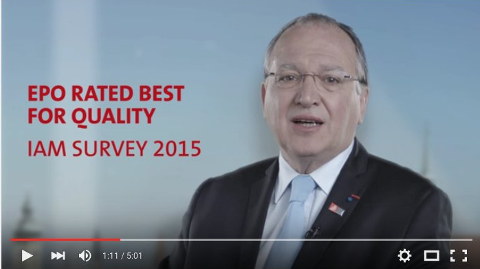12.26.16
Posted in Europe, Patents at 1:01 pm by Dr. Roy Schestowitz
2017: The Year of EPO Getting Leaky(ier)

This utterly absurd sentence was actually used by EPO recruitment in LinkedIn
Summary: When the brain drain deepens and the HR department is unable to replace talented people with other talented people an institution is basically doomed and the EPO under Bergot as HR head is going nowhere fast
TECHRIGHTS INTENDS to step up its work unearthing and exposing EPO scandals, even if that means leaving aside some software activism, antagonism of software patents at the USPTO (a problem which was increasingly being resolved in 2015-2016), and various other subjects that Techrights has been focused on for more than a decade.
The EPO is a rogue institution. People both inside and outside the EPO know that the direction the management has taken spells doom both for insiders and outsiders (like EP holders). As one person has just put it (anonymously) “PDHR has the highest staff turnover ever… only her body guards seem to survive! …this comes of course with a price tag of approx. 1 Million EUR a year on expenses, rumour also says that these individuals are not even registered in a company. Surprisingly the IU also appears to be too busy with harassing the SR’s instead of catching the big fishy HR stuff..”
IU is the investigative unit, which we exposed here before [1, 2, 3, 4, 5, 6, 7]. SRs are staff representatives — those who bear most of the brunt due to the IU’s aggression (an effort to disenfranchise EPO staff and control it by terror). PDHR is one who appears to have gotten her job thanks to family connections [1, 2, 3, 4] and her department is crumbling. This isn’t new to us. Last week we reported that she was probably having conflicts/infighting also (allegedly involving the IU). Her newly-found bodyguards addiction was covered her several times before and we constantly hear truly embarrassing stories about her — though we cannot tell such stories for fear that it would compromise sources. Bergot, being a member of Team Battistelli (confidants and family members), has become a liar too.
Well, in 2017 we intend to take it up a notch and climb deeper down the EPO’s throat. If Team Battistelli is wise enough, it will follow Willy Minnoye's footsteps and take as early [sic] (actually, much belated at age 70 or so) retirement. Vice-President Minnoye was quite vocal about his fear of Techrights and EPO leaks. Well, it’s about to get worse for them and no doubt they will attempt to silence us. That’s how Battistelli and his goons deal with media. That’s revolting. It’s absolutely disgusting and unheard of (for sure unprecedented at the EPO). █
Permalink
 Send this to a friend
Send this to a friend
12.23.16
Posted in Europe, Patents at 7:45 am by Dr. Roy Schestowitz
Do pigs know they have been patented at the EPO?

Summary: The EPO comes under fire from yet more stakeholders, after the EPO belatedly realises that patents on life are utterly absurd
AMONG many EPO scandals we have patent scope and specifically the patenting of living organisms. The EPO should never have extended the scope of patents to the point where seeds, plants and animals become subjected to patents. This led to a public relations disaster and now to a sort of retraction that harms the EPO’s reputation even more. As the law firm Marks & Clerk put it this week:
The European Patent Office (EPO) has stayed all examination and opposition proceedings relating to plants and animals obtained by essentially biological processes. This pause will give the EPO time to consider a Notice of the European Commission relating to the relevant provisions of Biotech Directive (98/44/EC). Search proceedings are not affected.
The Enlarged Board of Appeal (EBA) has previously held in the Broccoli II (G2/13) and Tomatoes II (G2/12) decisions of March 2015 that Article 53(b) EPC excludes from patentability essentially biological processes for the production of a plant or animal but that the plant or animal produced by this process may be patentable. It was decided, in effect, that the exclusion was directed to the process, not the products of that process as exclusions under the EPC must be interpreted narrowly. Our previous article discusses this in more detail.
“So, let me get this right,” one person wrote about this scenario yesterday, noting that “whoever at the EPO took this action clearly never heard about the concept of separation of powers?”
Here is the full comment:
Step 1: some “concerned” groups with political clout apply pressure upon the European Commission.
Step 2: the Commission bows to that pressure and issues a note (based upon questionable legal analysis) interpreting certain legislation.
Step 3: solely upon the basis of the Commission’s note, one of the bodies tasked with “enforcing” that legislation stops following a ruling from the judiciary upon the very point covered by the Commission’s note.
Forgive me, but would I be right in thinking that whoever at the EPO took this action clearly never heard about the concept of separation of powers?
Of course, this is also another instance in which a decision of the Enlarged Board of Appeal is effectively ignored by the EPO management. How long can this continue? And what will the judges in Karlsruhe make of it?
Another person wrote: “Shouldn’t it be Art 52(3) EPC (patentability) instead of Art 54(3) EPC (novelty)?”
Yet another person added: “There may be some serious Treaty impacts to deny patents in this field of technology (“reproducible” or not)”
If the EPO, led by a crazed yet totally unaccountable non-scientific autocrat like Battistelli, was left to decide on patent scope on its own, then obviously it would totally lose control, just like SIPO did (in the name of “production”).
Marks & Clerk has just published another article about the EPO, this one about Directorate Quality Support (DQS) — not to be confused with patent quality.
Complaints to the European Patent Office (EPO) are dealt with by a central EPO department known as Directorate Quality Support (DQS), which is also solely responsible for drafting and sending the official EPO response to the complainant. The default position is that both the original complaint and the reply thereto issued by DQS on behalf of the EPO are not made public, but rather are kept in the non-public part of the file to which the complaint pertains. This default position was apparently established by a decision of the President of the EPO in 2007. On the face of it, this would not appear to be a particularly contentious position, and is possibly justified given that complaints could be prejudicial to the legitimate personal or economic interests of third parties. Presumably the EPO would rather not place itself in a position of being a public outlet for any such potentially prejudicial remarks.
However, when it comes to oppositions before the EPO, a potential conflict with the above position arises owing to the conditions set out in Article 101 EPC in conjunction with Rules 79 and 83 EPC which, in summary, mandate the EPO to notify all exchanges to all parties during opposition proceedings. This would appear to include the notification by the EPO to the patent proprietor, for example, of any exchanges between the EPO, including the DQS as part of the EPO, and the opponent.
Some time in the future, potentially next year, we are going to show some letters from dissatisfied EPO costumers [sic] (that’s the term Team Battistelli likes to use, along with “production” and other business-oriented terms). We generally intend to take it up a notch next year, as salvage from Battistelli’s harm seems attainable now that most of Europe's largest economies antagonise Battistelli. The EPO as it stands at the moment is a doomed project; saving it requires major ‘reforms’ (like permanent removal of Team Battistelli). █
Permalink
 Send this to a friend
Send this to a friend
Posted in Deception, Europe, Patents at 7:13 am by Dr. Roy Schestowitz
Photo credit: British government (official profile)
 Summary: The British economy, which is dominated by SMEs, would be greatly harmed by the Unitary Patent if it ever became a reality, but echo chambers of the patent microcosm intentionally misrepresent such businesses and lobby politicians
Summary: The British economy, which is dominated by SMEs, would be greatly harmed by the Unitary Patent if it ever became a reality, but echo chambers of the patent microcosm intentionally misrepresent such businesses and lobby politicians
THE EPO‘s management, led by an autocrat who has promoted the UPC for many years, would like us to believe that the UPC is an SME ‘thing’ (the very opposite is true).
Yesterday we saw MIP, which organised UPC propaganda events (funded by the usual suspects), trying to piggyback Sean Dennehey for UPC promotion. We wish to ensure that Dennehey knows what/who the UPC really is for, as these UPC propaganda events were set up specifically for the purpose of brainwashing public officials. The people who organise and fund such events are chronic liars, as we have chronicled here for a number of years. “Dennehey took on the role of acting chief executive following the Brexit vote earlier this year,” MIP explains, “when the IPO’s former head John Alty moved to the newly created Department for International Trade.”
Dennehey is actually a good guy. Since he took over the UK IPO (or UK-IPO) he has done something useful for a change — something that can help small businesses. He oughtn’t be seduced into the toxic illusion that the UPC would somehow help SME; it would, in reality, harm them the most.
The article from MIP is behind a paywall, but based on what is said about it (e.g. this tweet which says “Sean Dennehey outlines UK’s ‘very firm commitment’ to #UPC in wide ranging interview in @ManagingIP”), Dennehey simply ignores the fact that UPC is not compatible with Brexit and would definitely harm the UK, all for the gain of patent trolls, foreign companies, and their lawyers, which may (not necessarily) be based in London.
Why is the UPC highly unlikely to happen in the UK? revisit this 7-part series:
We remind readers that Lucy has just left her job, after she foolishly promoted the UPC, defying logic and even getting slammed for it by domain experts. As this comment from yesterday put it: “And the Baroness is now moving on (to presumably greater things rather than as any disciplinary action). New hand on the tiller? And which direction will the joining go? Steady as she goes, or hard about and head for safe waters??”
Even an ode was put together about this (already!) and it spells out “SACKED”:
S o Lucy lasted 24 weeks at full throttle
A UPC genie needs to be squeezed back in the bottle
C ould be a rolling stone gathers no moss
K ing Batters loses a chinchilla,is mourning the loss
E ager beaver sought to lay the ghost
D id Lady Garden apply for the post?
Sean Dennehey ought to know, based on discussions he had with EPO staff, that not everything he is being told by Battistelli is true. That’s applicable to the UPC as well.
He has already resisted Battistelli in the last meeting (disciplinary procedures ‘reform’ in October) and resisted the exile of the appeal boards last week (latest meeting). The latter vote did not manage to sway the overall balance against countries whose vote Battistelli is allegedly buying, but it sends out the message that large European economies don’t act like chinchillas of Battistelli. They increasingly antagonise this crazed tyrant who is burying the Office and greatly harming stakeholders (like EP holders).
The EPO should actually staff the grossly understaffed boards, but all it does under Battistelli is throwing of interns at them (tweet from yesterday, along the same lines as earlier this month); that’s how Battistelli kills them (along with other measures), some say in order to demonstrate their ‘failure’ (same tactics which are being used against the NHS) and then propose UPC as the ‘fix’. █
Permalink
 Send this to a friend
Send this to a friend
12.22.16
Posted in America, Free/Libre Software, Patents at 9:44 am by Dr. Roy Schestowitz
 Summary: Innovations associated with Bitcoin/Blockchain — advancements which are largely Free/Open Source software-centric — are under threat from financial giants that effectively besiege/threaten startups using a barrage of software patents
Summary: Innovations associated with Bitcoin/Blockchain — advancements which are largely Free/Open Source software-centric — are under threat from financial giants that effectively besiege/threaten startups using a barrage of software patents
THE USPTO insists that it makes the US more competitive, but in many cases it actually helps large companies undermine small ones, not foreign ones.
Case of point: see the new article “When a patent-happy industry meets open-source technology” [1, 2]. To quote from the article:
When the financial services industry started paying attention to blockchain technology, many companies, seemingly as a reflex, sought patent protection for their ideas.
It was ironic, since the original bitcoin blockchain was a breakthrough of open-source development, in which software code is made freely available for anyone to use or modify. As the industry has gained a clearer understanding of how distributed-ledger technology could change its business, it’s begun to see the merits of such openness in supporting collaborative innovation, and the limitations of the traditional, you-can’t-touch-this approach.
Some are even using a hybrid strategy, pursuing patents to secure a competitive advantage – or at least protect themselves from legal challenges – while publishing code and inviting others to improve it by submitting fixes or patching bugs. The situation underscores the cultural differences between the banking and technology fields as the former looks to the latter for help meeting the demands of an increasingly digital world.
IBM’s Manny Schecter was interested in this and Benjamin Henrion told him that these conglomerates pursuing patents on Blockchain technologies is “like oil companies patenting everything solar.”
This isn’t entirely new a revelation. It’s an old trick in many industries (absorbing or denying competition that suggests alternative paradigms). Big Banks are essentially attacking Bitcoin, Blockchain etc. using software patents and today we found two more articles about it, “Blockchain patent filings by Goldman, others tip future cost risk” and “Corporate Patents on Blockchain Could Create Legal Problems for Startups”. Well, that’s the intention.
“Thankfully, a lot of software patents pertaining to payments and finance are being invalidated these days (thrown our by court), more so than in any other field.”“Over the past few months,” one of these articles says, “some of the world’s largest financial companies including Goldman Sachs, Bank of America and Mastercard – have been patenting promising Blockchain methodologies. Despite a common perception that Blockchain is Open Source and developers can freely use Sotoshi Nakamoto’s ideas from bitcoin to build new systems, it still could mean costly legal problems for fledgling startups, lawyers and others are saying.”
We wrote about this not too long ago in relation to MasterCard. A lot of the above culminated in the publication of “Big Banks Are Stocking Up on Blockchain Patents” (early yesterday in Wall Street media). To quote:
In the headlong rush to revolutionize modern finance, blockchain enthusiasts are overlooking one potentially costly problem: their applications, built on open-source code, may actually belong to someone else.
Recently, some of the biggest names in business, from Goldman Sachs to Bank of America and Mastercard, have quietly patented some of the most promising blockchain technologies for themselves. Through mid-November, the number of patents that companies have obtained or said they’ve applied for has roughly doubled since the start of the year, according to law firm Reed Smith.
Our readers are smart enough to know what’s wrong with this picture. Gullible people may try to frame this as a sign of “adoption” and “success”, but the large financial firms just want to guard their monopoly/oligopoly, they don’t want disruption.
Thankfully, a lot of software patents pertaining to payments and finance are being invalidated these days (thrown out by courts), more so than in any other field (about 90% of the time). That’s similar to business methods, too.
Are patent examiners in the US paying any attention at all to what courts have been arguing over and over again? █
Permalink
 Send this to a friend
Send this to a friend
Posted in Deception, Europe, Patents at 9:19 am by Dr. Roy Schestowitz
Just doin’ his Joff…

Summary: Criticism of the continued, ever-accelerating erosion of patent quality at the European Patent Office (EPO) and shameless attempts by Battistelli to cover it up using money (EPO budget thrown at the media)
THE very few times that IAM merely took note of EPO scandals these mentions became top stories, according to figures published today by IAM’s editor. Shouldn’t IAM take that as a clue and actually engage in journalism, instead of persisting in propaganda for Battistelli? (see above)
“Shouldn’t IAM take that as a clue and actually engage in journalism, instead of persisting in propaganda for Battistelli?”The EPO, as even insiders tell us, continues to grant patents it should never have granted at all. This includes software patents. Even examiners who are against software patents eventually grant them (under pressure) and this new article should make furious anyone who has EPs. Values of EPs erode because patent quality ceased to exist under Battistelli. As the article puts it: “The European Patent Office (EPO) continues to grant many patents relating to antibodies, and in doing so applies the same patentability criteria as to other inventions. However, some commentators have suggested that antibodies are regarded as a special case by the EPO when evaluating inventive step / obviousness.”
For those who are not familiar with this domain, antibodies are (based on Wikipedia) “Y-shaped protein produced mainly by plasma cells that is used by the immune system to identify and neutralize pathogens such as bacteria and viruses.”
“The EPO, as even insiders tell us, continues to grant patents it should never have granted at all.”File this under another case of “patents on life” — a subject which even the USPTO has not been all that gullible about. Does Europe want to privatise or monopolise even fuctionalities associated with biology or the human body (naturally-recurring and found in nature)? Where does this end?
Brian Cronin, a Patent Attorney from the UK (who works in Switzerland now), has just published this article about “European inventive step” and having read the whole thing from Watchtroll (the rudest element of the patent microcosm) we are left unconvinced; nowhere does it mention the erosion of patent quality; instead if repeats the empty claims (from EPO management) of leadership on quality grounds, citing IAM of course. It concludes with this paragraph:
The EPO proudly boasts that it is consistently rated number one for patent quality among the world’s largest patent offices based on user surveys. Patent quality is also a major objective for the USPTO, who are striving to improve their lower user ratings. This article suggests that a contributing factor to the EPO’s perceived high quality is the coherent way inventive step is handled, this involving the institution of examining divisions and use of the problem-and- solution approach by the examiners and by EQE-qualified practitioners. As opposed to this, the USPTO’s lower rating can in part be explained by its piecemeal handling of obviousness and less coherent input. Improving patent quality is a mantra of the USPTO management. If they could take steps to improve the coherence in handling obviousness, improved quality would follow.
At the moment what we are seeing is that the USPTO actually does improve patent quality, resulting in less litigation and abuses, whereas under Battistelli the EPO goes in the opposite direction. Weeks ago an international patent law firm publicly stated that it’s now easier to get software patents in Europe than in the US, in spite of Europe’s ban on such patents. Lawfulness is long gone from the EPO.
When will IAM stop producing lies (whilst receiving payments from the EPO’s PR firm) and when will EPO management stop citing IAM as ‘proof’? We have already given examples where the EPO also bribes mainstream European media for puff pieces, which Battistelli later cites to support his dubious claims. Such is the corrupting influence of the Battistelli-led regime. It corrupts the media as a whole at the (very high) expense of people who apply for and maintain EPs (renewal). █
Permalink
 Send this to a friend
Send this to a friend
Posted in Apple, Microsoft, Patents at 8:48 am by Dr. Roy Schestowitz
As we correctly predicted way back in 2011…

Nokia suing everyone… except Microsoft.
Summary: Few days before Christmas Nokia decides that the backlash from the media would be minimal enough to finally show its true colours and rear its ugly head again, putting a tax on phones that actually sell (unlike Nokia’s)
VERY LATE LAST NIGHT (as late as 2 AM) we wrote about a story which Nokia probably hoped the media would not notice/cover all that much (hence the timing/date in the year). Nokia is a patent troll now. “Meanwhile,” as this article puts it, “Apple has accused Nokia of using the ‘tactics of a patent troll’.” It’s not just about Apple as Nokia will go after Android OEMs next (if it hasn’t already).
It’s the ‘Microsoft effect’. The company likes turning other (usually vulnerable) companies into a pile of patents, weaponised against Microsoft’s rivals. There are many examples of that which we’ve covered here over the years.
“It’s the ‘Microsoft effect’. The company likes turning other (usually vulnerable) companies into a pile of patents, weaponised against Microsoft’s rivals.”We have already found about a hundred reports about this in English, in spite of Christmas absence of many reporters (even from large British publishers, US publishers and several people at IDG [1, 2]). The Finnish English-speaking media touches the subject and Wall Street media puts it behind a paywall. Tripp Mickle and Matthias Verbergt say that “Apple Inc. and Nokia Corp. filed competing lawsuits over intellectual property used in the iPhone and other Apple products.”
Worth seeing in this case is what Apple finds out about the network of trolls (typically shrouded in secrecy). With evidence admissible by the courts about the patent trolls of Nokia and Microsoft we can improve our information here (growingly extensive and occasionally praised by people who come here in order to understand cryptic trolls.). Florian Müller says “First court hearings in the new Nokia v. Apple dispute will most probably take place in Munich in a few months. I’ll probably go and listen.”
“We believe that the date of the press release was designed (or intended) to dodge negative press coverage.”He also quotes Apple’s spokesperson as saying that Nokia “is now using the tactics of a patent troll to attempt to extort money from Apple…”
He is “not mincing words anymore,” Müller adds, and someone from Finland agrees with him. Finns do not blindly support Nokia. We speak to some Finns who are extremely upset at Nokia. It’s a national embarrassment to some.
As for IAM, it thinks it’s favourable to have patent lawsuit from a troll-like Nokia, but it lacks a vital
disclosure; Nokia’s patent troll MOSAID (now called “Conversant”) has paid IAM, which recently did a lot of puff pieces for it. Maybe that’s just IAM’s business model…
IAM says “Apple is against patent owners doing what they want with their patents to maximise their value.”
Whose value? And to whose advantage? And at whose expense?
“Not sure how that helps R&D,” IAM says, but Benjamin Henrion has already responded to them by saying “that helps P&L [patents and litigation], not R&D.”
We believe that the date of the press release was designed (or intended) to dodge negative press coverage. █
Permalink
 Send this to a friend
Send this to a friend
12.21.16
Posted in Apple, GNU/Linux, Google, Patents at 8:31 pm by Dr. Roy Schestowitz
When all else fails, throw patents at the competition (through trolls so as to avert counteraction)?

Image from BusinessKorea
Summary: With billions of dollars at stake (maybe over a trillion in the long run), the attempt to claw revenue using patents rather than actual sales has become complicated because of plurality of intermediaries, which Apple is trying to tackle with a new antitrust complaint
“In a major antitrust lawsuit Apple charged that Acacia is illegally breaking terms of patents acquired from Nokia,” according to The Street. This is pretty major news and definitely something that warrants a 2 AM article. Florian Müller has already produced a long blog post about it, accompanied by or coupled with the relevant documents.
“Readers can find details like a detailed history in our Wiki page about Acacia, including the hiring (by Acacia) of people from Microsoft and this troll’s repeated attacks on GNU/Linux.”As a reminder to our readers, Acacia is a Microsoft-connected troll. Readers can find details like a detailed history in our Wiki page about Acacia, including the hiring (by Acacia) of people from Microsoft and this troll’s repeated attacks on GNU/Linux.
“For a long time,” Müller wrote today, “I had hoped someone would finally do this. Last year I called out Nokia and others on their privateering ways, and it turned out that Nokia had industrialized the concept of privateering to a far greater extent than anyone else. My list of PAEs fed by Nokia contained all of the defendants in Apple’s antitrust suit–Acacia and Conversant (technically, Apple is also suing particular subsidiaries of those)–and more. That post prompted attempts by Ericsson and Nokia to explain away their privateering ways.”
Nokia‘s patents have also been passed to another anti-Linux/anti-Google troll called MOSAID (renamed “Conversant” since). These were, for a fact, passed at Microsoft’s instructions, as reported in the mainstream media at the time. There’s more on that in the Korean media. When it comes to patents, Nokia is still enslaved by or subservient to Microsoft.
“What does the future of dying mobile giants have in store then?”The full story isn’t just Apple hitting back at Nokia. “Breaking news,” Müller wrote later, “Nokia sues Apple in US and Europe over alleged patent infringement […] Venues: Eastern District of Texas, three German courts: Düsseldorf Mannheim Munich…”
Europe is a growing and increasingly attractive hub for patent parasites already, I’ve told Müller (who probably agreed). Germany and sometimes the UK (London) are favoured among those parasites (see Ericsson's troll choosing London for legal attacks — quite unprecedented a move for such an entity). “For the troll that Nokia is now,” Müller noted, “suing Apple in the ED of Texas is very appropriate. […] When Nokia was still making mobile devices, it had a predilection for the District of Delaware. Now: Eastern District of Texas. Times change…”
I told him that BlackBerry does the same thing now, having lost the market (to which Müller nodded with a retweet). We wrote about this earlier this week and earlier this year.
What does the future of dying mobile giants have in store then? Passage to trolls (the PAE type) that will tax everyone, everywhere? “Something big always seems to happen at Christmas in the patent market,” IAM wrote. “Remember the RPX Rockstar patents purchase a couple of years ago?”
Remember that IAM is partly funded by MOSAID/Conversant, i.e. part of the same ‘gang’. As for Rockstar, we wrote quite a few articles about it, e.g. [1, 2]. It’s like a front for Microsoft (Rockstar Consortium is a patent troll owned by Microsoft, Apple, BlackBerry, Ericsson, and Sony). As for RPX, it’s also a patent troll, with Microsoft having joined it 6 years ago.
“My list of PAEs fed by Nokia contained all of the defendants in Apple’s antitrust suit–Acacia and Conversant (technically, Apple is also suing particular subsidiaries of those)–and more.”
–Florian MüllerNina Milanov, an occasional EPO sceptic, told Müller, “I hope Apple sees it through. Every time you settle, to some extent the troll has won.”
True.
“Last time Nokia sued Apple in Germany,” Müller responded, “it was extremely lucky. Key patents have expired. Will be more interesting this time around.”
If Apple gets to the bottom of all these satellite proxies that are patent trolls, it will be a good service not just to Apple but also to Android/Linux. iOS and Android command the market and all that the losers can do right now is attempt to tax those two. Even Oracle is trying to accomplish that. █
Permalink
 Send this to a friend
Send this to a friend
Posted in Europe, Patents at 7:49 pm by Dr. Roy Schestowitz
The Chinchilla Man of the Administrative Council too, under Battistelli’s instructions (tail wagging the dog), tried to remove a judge

Summary: The Administrative Council of the European Patent Organisation is coming under fire for its role in weakening the appeal boards and the confidence in already-granted EPs (European Patents) continues to erode
EARLIER TODAY we noted that a comments thread about the EPO‘s patent scope had turned more interesting than the ‘article’ (self-promotional piece) itself. People have been noting that this diversionary tactic from the EPO can backfire pretty badly on the EPO.
“Julian Cockbain” (possibly a pseudonym but not for sure) said that “the problem is not with Tomatoes II but with the EBoA’s craven reaction to the Biotech Directive in G-1/98. Correctly decided then, the problem would not have arisen now…”
“One more example of the fundamental lack of accountability of the executive in the European patent system.”
–AnonymousWe have been writing about this for a number of years. The EPO should never have granted patents on plants, seeds and animals in the first place. Now it pays the price and people will lose confidence in their EPs. The following three comments were all posted anonymously, presumably by domain experts afraid of retaliation for their open expression of views. “The decision by the President of the EPO [that's Battistelli] to stay all the concerned proceedings cannot be appealed before the Boards. One more example of the fundamental lack of accountability of the executive in the European patent system,” said one comment. Yes, it helped expose how out-of-control the EPO has become.
Another comment said that “it’s clear that in the long term the Enlarged Board cannot remain independent of the EU, particularly once [sic] the UPC is up and running” (that should be if, not once). The boards are in general under attack from Battistelli, who is pushing hard for the UPC and will sort of oversee the boards until a UPC booster finally becomes their President (see some background on Carl Josefsson's role in UPC training). To quote the full comment: “The EPO chose to bring itself under the jurisdiction of the EU when it brought the Biotech Directive into the EPC rules. Now it has to stay proceedings to sort this all out. There is no point granting/maintaining patents which are not valid according the Biotech Directive. It’s clear that in the long term the Enlarged Board cannot remain independent of the EU, particularly once the UPC is up and running and presumably the CJEU will then be looking at patent cases at lot more regularly as the final appeal court for the UPC. We clearly cannot have 2 final patent courts in Europe and this is a good opportunity to start the process of allowing the CJEU to take over the responsibilities of the Enlarged Board.”
“As the EBA did not abide by the wishes of the AC (and of the president) in this matter, it was relocated to Haar.”
–AnonymousOne person asked: “Why bother about separation of powers? It started with the house-ban of a member of the BA by the president of the EPO a while ago. It continued. As the EBA did not abide by the wishes of the AC (and of the president) in this matter, it was relocated to Haar. As long as the AC has not amended the Rules, there is no objective reason to stay any proceeding. By staying the proceedings, the BA are also touched. Another good way to retaliate.”
We recently argued that the Administrative Council was complicit and under the control of Battistelli rather than it being the other way around (as it ought to be). As the Administrative Council is controlled by Battistelli's pet chinchilla (alluding to the darker side of his life), this is hardly surprising. █
Permalink
 Send this to a friend
Send this to a friend
« Previous Page — « Previous entries « Previous Page · Next Page » Next entries » — Next Page »



 Summary: The British economy, which is dominated by SMEs, would be greatly harmed by the Unitary Patent if it ever became a reality, but echo chambers of the patent microcosm intentionally misrepresent such businesses and lobby politicians
Summary: The British economy, which is dominated by SMEs, would be greatly harmed by the Unitary Patent if it ever became a reality, but echo chambers of the patent microcosm intentionally misrepresent such businesses and lobby politicians Summary: Innovations associated with Bitcoin/Blockchain — advancements which are largely Free/Open Source software-centric — are under threat from financial giants that effectively besiege/threaten startups using a barrage of software patents
Summary: Innovations associated with Bitcoin/Blockchain — advancements which are largely Free/Open Source software-centric — are under threat from financial giants that effectively besiege/threaten startups using a barrage of software patents



















 Content is available under CC-BY-SA
Content is available under CC-BY-SA